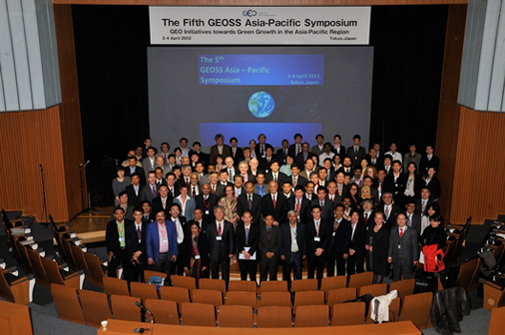The 5th GEOSS Asia-Pacific Symposium was successfully held from 2 to 4 April 2012 in Tokyo, Japan. Approximately 280 participants from 21countries and 4 international organizations attended the symposium.
Thank you very much for your cooperation.
4th April, 2012
Tokyo Statement
The participants of the 5th Global Earth Observation System of Systems (GEOSS) Asia-Pacific Symposium, hosted by the Group on Earth Observations (GEO), call upon the United Nations Rio + 20 Conference on Sustainable Development to recognize the critical role of Earth observations for informing an economy based on Green Growth. In particular Earth observations can accelerate the transition to a green economy that promotes sustainable growth and improves human well-being by jointly pursuing economic growth and the environment with proper stewardship of natural assets and benefits of ecosystem services.
Earthquakes and tsunamis, floods and droughts, ecosystem degradation and biodiversity loss in freshwater, coastal and forest environments, and climate change impacts endanger the security of water, food, energy, health and ecosystem services across the Asia-Pacific region today. Comprehensive, coordinated and sustained Earth observations and information are needed as a basis for sound decision making. Earth observations also form an integral part of regional cooperation to strengthen resilience to natural disasters and global climate change, harmonize society with nature, promote energy-security and establish a low-carbon society.
The effective use of wide-ranging knowledge and experience obtained through sharing data and information can support the transition to a green economy. Such data sharing will lead to the informed allocation of land and water use, the proper valuation and preservation of ecosystem services, and the reconciliation of environmental sustainability and economic development.
The Group on Earth Observations (GEO) has been advancing the Asian Water Cycle Initiative (AWCI) and the Asia-Pacific Biodiversity Observation Network (AP-BON), and is promoting regional cooperation under the GEO Global Agriculture Monitoring initiative (GEO GLAM) and the Global Forest Observation Initiative (GFOI). Discussions on data integration in jurisdictional waters of multiple countries have just begun including supports to/from the Intergovernmental Oceanographic Commission Sub-Commission for the Western Pacific (IOC/WESTPAC) and Regional Global Ocean Observing Systems in Asia-Pacific region. These projects and activities demonstrate the value of Earth observations and information and will serve as a model for regional cooperation, enabling scientists, practitioners, decision-makers, citizens and other stakeholders to work together towards achieving sustainable development.
 |
The Symposium will further strengthen international networking within the region and share the Asia-Pacific’s experiences with the world. Each country will report on the progress it has made in implementing GEOSS since the last Asia-Pacific Symposium in Indonesia.
To focus the discussions, parallel sessions on the following topics will be organized.
- Asian Water Cycle Initiative (AWCI)
- Asia-Pacific Biodiversity Observation Network (AP-BON)
- Forest Carbon Tracking (FCT)
- Ocean Observation and Society
- Agriculture and Food Security
